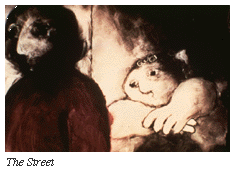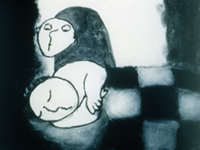


The Street 我祖母將過去的夏天
 |
 |
 |
蒙特婁的猶太裔作家Mordecai Richler回憶幼時祖母久病在床的故事(由短篇小說"The Summer My Grandmother was Supposed to Die"改編)。人言「久病床前無孝子」﹐作者的母親雖侍奉祖母無微不至﹐但卻造成家人很大的困擾。本片透過一個小孩的眼光﹐細膩地呈現老人與其他家人的關係﹐以及兒童對死亡和大人世界的觀感。 Summary: The boy remembers that it is a hot summer when the grandmother is about to die. The coming death ('it could be any day') preoccupies the kid. From the kitchen, they can 'smell' it. On the street, they talk about it (about death throe and whether the hair grows after death, and what her ghost would look like). The boy complains also because his bedroom has been taken by the grandmother, and that his mother asks him to kiss the grandmother goodbye everyday. The long-term illness also takes its toll on the mother. She gets exhausted and becomes bed-ridden. The father, as a result, decides to send the grandmother to a nursing home. When the mother gets better, she goes to visit the grandmother, and ends up taking her mother home. The father, looking on, said, "I was born lucky and that's it," meaning that he is not lucky but he takes it. On a Friday afternoon, the boy comes home to find a crowd there. The boy gets concerned, knowing that the grandmother is dead. But he is more concerned with his mother than with the death. The mother gives the son jewlery the grandmother passed on to her. The boy just said, 'who's getting married?' In the room and on the balcony, the adults cry or talk about the death. The doctor and the rabbi comment respectively on how the death is a contrast to the beautiful summer day and how the grandmother held on for so long before she died. At night, the boy refuses to sleep in that room, revealing that he is actually afraid. He and his sister talk again about death (wondering if a hanged man will get orgasm before he dies). The film ends with one playing the grandmother's ghost--probably done by the sister--calling the boy: "Boyio--Boyio--" Issues and Discussion Though set in a Jewish community, the story present the following issues
which we can relate to: Starting Questions: For Further Discussion: |